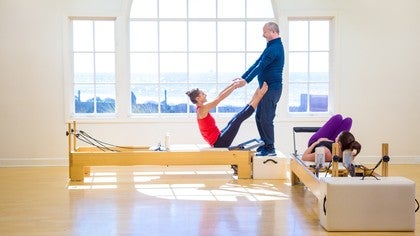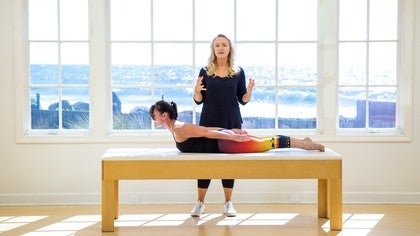Description
About This Video
Transcript
Read Full Transcript
Hello everyone and thanks for joining me today. I want to give you my top 15 tips on auditioning. So we're going to give you, I'm going to give you five tips for before your audition. Then we're going to talk about five things you should be aware of during your audition and then five things you want to do after your audition. So let's begin with before your audition. First thing, be prepared.
So by this I mean have your resume ready. If you are looking for a job or something comes up, a Polonius position comes up. You want to be ready, you want to have your resume up to date. It's gonna really benefit you to always go back and freshen up your resume and have it ready just in case that perfect job comes up or a better position comes up or something comes up that you weren't expecting. And there are many, many resources for how to write a good resume and have some recommendation letters as well. That is always really helpful. I've done a ton of auditions, both myself and being the person who is giving the auditions over the years, probably hundreds and I've seen some really good ones and I've seen some really bad ones. So I really thought it was a good idea to share with you some of these things that I know will help you to get that job of your dreams.
So after the preparation, the next thing is getting organized here is go and take a class. You want to actually go to the studio, are the facility where you're going to be auditioning. It really makes a big difference because number one, it shows that you're interested in what's going on at the facility and you're interested in finding out whether or not it's a good fit for you as well. But to find out about the people that you're gonna be working with and about the clients that you're going to be training. So take a class, take a private, just go and visit the studio, get a feel for the vibe, understand what you are going to be wanting to prepare for when you go and actually audition. It's also really good because you know what, how you get there if you're driving or taking public transportation, what you need to do in order to get there on time, what's the parking situation? All of those things will help you relax and do your best and also show up on time. So that's a really important part of getting prepared.
The next thing I want you to think about is your workout. What are you going to do? So there might be a specific class type that they're asking you to do, or they might give you your choice. Teach a mat, teach a reformer, teach a multi-client. If you're given the choice, the best thing to do is teach what you're most comfortable with and what you actually want to be doing at the studio. It kind of makes sense, but sometimes people think, well, I should probably impress them and try to teach all equipment, but if you're not, if that's not what you normally do, it's not putting your best foot forward. So make sure that you are putting your best foot forward and have a workout plan. Don't go in and wing it, even if you're a seasoned instructor, because a really good person who's auditioning you knows if you're winging it. So have a workout planned out.
Know what you're going to do from start to finish. Know how much time you're given for the audition, and if you don't ask, make sure that you don't get the hook. Make sure that you're actually you being able to perform your entire workout and what you have planned and you know it well enough that you can do it in the timeframe that's allotted to you. It makes a really big difference. Honoring People's time is so important, not just in an audition, but also in life and when you're dealing with clients. The next thing is think about music. So when you go and visit the studio, notice whether instructors are using music during their classes or whether it's a studio where music is not preferred, and if it's a studio where music is preferred, then have a playlist ready.
Know what the hookups are so that when you get there, there's not, you have this great music plan but you don't know how to connect to the stereo, do that stuff before the audition so that when you go in you're confident, you have your music ready and you're ready to go and when you're planning your play list, please choose appropriate music so the music should match the workout that you're doing. Sometimes if you're teaching a math class and it's a bit of a higher energy, the music will match that. Now probably not rap, but something that has a little bit more of an ommph behind it. If it's more of a reformer, quiet room class with, you know, pick the music that you like, but also don't get stuck in one John Rhe I see that happen a lot of times where people will play Beyonce the entire time. You want to make sure that it's a mix so that if there are people in there with different preferences than you, you're kind of touching on all of them and everybody gets something that they want. At some point. Music can really add a lot to a class and it can really make you stand out in an audition. If it's a studio that actually has music during classes.
The next thing is to choose the correct outfit. You want it to be professional and you want it to fit. All right. You want to make sure that when you're walking in, you have already visited there. So you know how people typically dress there. But even if you go to a place and maybe some of the instructors aren't dressed as professionally as you would be, dresses professionally as you can. It is your audition. It's your first impression.
So you want to have the good fitting clothes, clothes that aren't ragged and clothes that match that of an instructor. The next thing is beyond time. And by beyond time, I mean be early. So when I used to audition and I did it a lot, I would go to a place and stay, make sure that I got there about 15 to 20 minutes early so that I was relaxed and I didn't go in 15 to 20 minutes early. I sat out in my car, I reviewed my teaching notes, the things I was going to teach, and I thought about what I wanted to accomplish during that audition. It's a really important aspect to be calm when you walk in so that you can put your best foot forward. So those are my five tips for before. Now let's talk about what to do during, we've already touched on time and you know the importance of it and that's number one. Start on time if possible.
If they're running late, that's one thing. If you are running late, that's a different thing for me. If somebody comes in late, it's PR. I'm pretty sure not going to be hiring them. That's a nonstarter for me unless there's a really good reason and a good reason is I only planned for two accidents and there were three accidents on the way. Okay? So I'm also, if you are running late, if something unforeseen happens, it's your responsibility to call and let them know what's happening and give them the opportunity to reschedule if they need to or cancel the audition altogether. It's their choice. The next thing I want you to remember is that when you walk in, be thankful you're getting an opportunity to work somewhere, so you should welcome everyone that's taking your audition.
Usually when, uh, I would do auditions or when we do auditions at our studio, we either have instructors that volunteer their time to be the participants or we have clients that volunteer their time to be the participants. You need to be nice to everyone. You need to welcome them, you need to thank them. You need to try to learn their names and you need to give them a great class with a lot of attention. They are most likely going to be giving feedback to the hiring person and you want to make sure that you put your best foot forward. Plus that's what teaching is all about and that's what you're auditioning for.
The next thing is you've prepared. You should have your class ready for whatever it is that you want to teach, but don't read from your notes. Don't hold a paper in your hand and look at it. Keep going back to it and checking to see what the next thing is. You want to make sure that you have that workout. Memorize, backward and forward so that when you're going out there and teaching that class, you know it so well that you can actually teach, which is what you're auditioning for. People can see you making great corrections or really, you know, if you're in a room of instructors, there might not be a lot of correcting to do, but there will be a lot of acknowledging that people are doing things correctly and perfectly and positive reinforcement, which is one of the best things about, I think about being able to teach.
So make sure that you know what you're going to do backwards and forwards. Have a plan B, have a plan c and have a plan d cause you don't know who's going to show up and you don't know what level they're going to be at or what physical things are happening with them. So you may have what you think is the perfect workout and you walk in and there's three people that can't do certain of the exercises. So you as a teacher already need to know how you would manage that in a class. If it's just one person, you need to know how to manage that and not make the person feel bad or be a deer in headlights like, oh, this is off plan.
So make sure that you have that plan B, Plan C and maybe even a plan d. The next thing is you want to make sure that you're not explaining your workout. You're teaching your workout. So what by that I mean when you're actually talking to the class, you're teaching the exercise, you're not telling them why you put the exercise into your audition or what you could have done. Instead, you're actually really fluid and going through it. Um, they can ask you questions afterward or you can follow up if there's something that you think is really important for them to know about the workout, but you should treat it like a class and teach it like a class. And next you want to make sure that you end on time.
You want to make sure that you are honoring people's Times. So again, I talked about it before. Don't get the hook. Make sure that you begin and, and that class on time. And if you have music that you're using, you should actually match the music to your class and the playlists should last as long as the workout is. And it should end with the end of the workout. If you have even just one really good class that you've put together with music, that's great. But if you can have a couple of different options, that's even better. Now let's move on to my five tips for after an audition because you might nail that audition, but there's some really important things that need to happen after the audition that we look for. So the first thing is you want to thank everyone who just took the time to take that class to take that audition from you. So make sure that they know that you appreciate them and if you know their names, make sure you use their names during that time.
It makes a really big difference. Um, and it shows that you care about the people who took time to take the class. The next thing is answer any questions that there are. So don't ask for feedback. That's not the appropriate time for you to do that. They may offer feedback and that's great, but wait until after the audition and maybe send an email or a text to ask if there's anything that you could've done better. Um, but I wouldn't for it during the audition. The other thing is to make sure that you follow up and I just talked about that a little bit, but it's really, really common courtesy to send a note afterward. Um, it's Kinda old school, but I kind of really appreciate it when somebody actually sends a thank you note in snail mail.
It's kind of really cool to see that and it sets you apart from some other people. The very least, you either send them an email thanking them or you send them a text asking maybe what the next steps are and then finally enjoy the process. It's a learning process and you might not hit it out of the park the first five or 10 times that you go into audition. And that's okay. Because what I want you to get from this is the experience of knowing how to teach new people and the IX. And it is a skillset going to audition. So you have to develop it. And it sometimes takes time to do that. But don't ever be offended when somebody doesn't hire you, because if they're not hiring you, it's probably a good bet that you wouldn't have been happy there either.
So it's a two way street. Remember that if you don't get the job, and even though you think it might've been the best job in the world, there might've been a really good reason. The universe is telling you, not now, maybe later or maybe not ever. And just go onto the next thing. So those are my 15 tips for before, during, and after an audition. I hope you got a lot out of it and good luck. Now go get that job.
The Teacher's Corner: Teaching Tools
Comments
You need to be a subscriber to post a comment.
Please Log In or Create an Account to start your free trial.


















